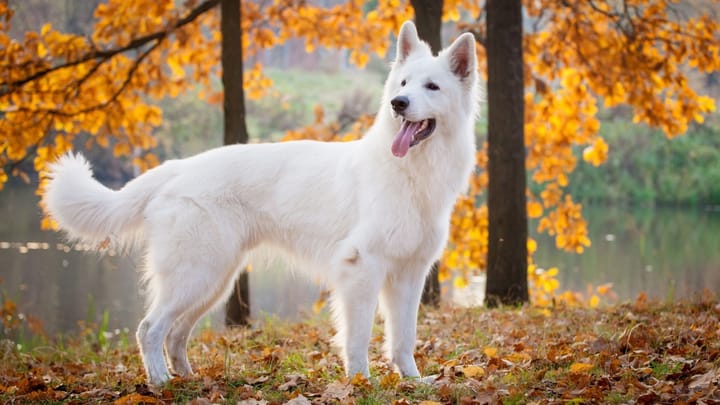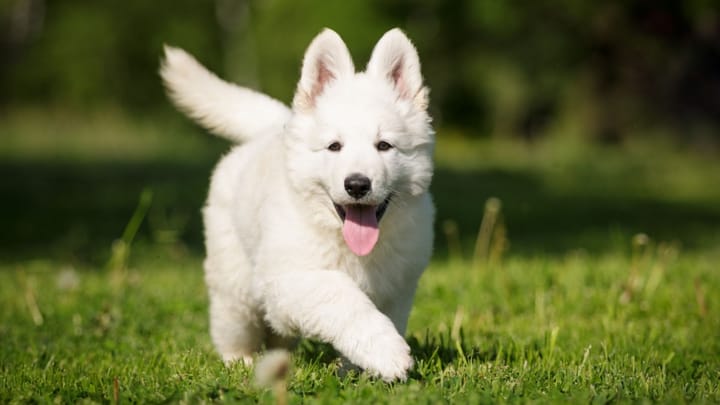White Swiss Shepherd Dog
Other names : Berger Blanc Suisse, White Canadian Shepherd, White American Shepherd, Weisser Schweizer Schäferhund


The White Swiss Shepherd Dog is a robust dog, of medium size, sporting an immaculate white coat that differentiates her from her close cousin, the German Shepherd. She is a particularly intelligent, well-balanced and athletic dog who can, nevertheless, by virtue of her natural sensitivity, fall victim to a delicate syndrome: hyper-attachment to her master. She can, however, adapt to many family constellations and various ways of life, as long as she is given sufficient attention.
|
Life expectancy |
The White Swiss Shepherd Dog has a life expectancy of between 10 and 14 years |
|
Temperament |
|
|
Size |
Medium
|
|
Adult size |
Female
Between 21 and 24 in
Male
Between 23 and 26 in
|
|
Adult weight |
Female
Between 55 and 77 lb
Male
Between 66 and 88 lb
|
|
Coat colour
The only coat color of the White Swiss Shepherd breed that is admissible by official standards is, as the name indicates: white. |
White |
|
Type of coat
Two varieties exist, the long-haired White Shepherd Dog and the medium-long haired White Shepherd Dog. She dons a double coat, with a smooth and coarse overcoat, which is dense and flat. The undercoat is abundant . Some subtle waviness is admissible for both varieties, and the long-haired variety has a distinct mane around the nape. |
Long |
|
Eye colour
Colours vary from brown to fawn-brown. |
Brown
|
|
Purchase price |
The White Swiss Shepherd Dog costs approximately 920£ |
The rumour that has the White Swiss Shepherd’s white colour linked to pathologies is completely unfounded, as proven by this breed’s demonstrably excellent health.
More details about the White Swiss Shepherd Dog
White Swiss Shepherd Dog: Origins and history
The colour white being excluded from the German Shepherd breed, this breed was raised and selected as a completely separate breed (first under the name: White Canadian Shepherd). The first traces of White Shepherd dog-breeding before the 1900s are to be found in the Alsace-Lorraine region: pure-bred White Shepherds were raised at the royal Habsburg court.
In 2002, Switzerland, which imported its first units in the 1970s, claimed ‘paternity’ over the breed, which was officially recognised by the FCI under its current name.
Physical characteristics of the White Swiss Shepherd Dog
She is similar to the German Shepherd in all aspects, save for the fact that she is slightly leaner and less angular than the model black-and-fawn German Shepherd. The standard presupposes a robust and strong shepherd dog, well-built, medium-sized, with ears pointing upwards and a white double-coat, either long or medium-long. The eyes are almond-shaped, slightly oblique. The ears are large, triangular and perfectly straight. The tail is tucked in and attached rather low, reaching mid-hock.
FCI classification of the White Swiss Shepherd Dog
-
Group 1 - Sheepdogs and Cattledogs (except Swiss Cattledogs)
-
Section 1 : Sheepdogs
White Swiss Shepherd Dog: Characteristics
White Swiss Shepherd Dog: Behaviour
Training a White Swiss Shepherd Dog
This shepherd dog is particularly docile, as she is so receptive given her undying devotion to her owner. She wants to spend time with him or her and please them above all else, which facilitates training sessions.
What’s more, her intelligence allows her to quickly understand what is expected of her.
Be careful nonetheless, this sensitive dog will not tolerate any kind of brutality or injustice! Firm yet delicate training will be necessary, in accordance with the principles of positive reinforcement (rewarding good behaviours).
Rules of conduct will have to be introduced bit by bit as soon as the Shepherd puppy integrates the home, in order to avoid her from picking up bad habits.
White Swiss Shepherd Dog: Lifestyle
Breed compatibility White Swiss Shepherd Dog
White Swiss Shepherd Dog: Purchase price
The price of a Swiss White Shepherd varies depending on its origins, age, and gender. You have to count an average of £920 for dogs subscribed to the Kennel Club.
The required monthly budget wavers in between £45 and £55 to cater to the needs of this big white dog, including food and basic care.
White Swiss Shepherd Dog: Shedding
Average
Hair loss is moderate but steady, reaching its peak during both moulting seasons, autumn and spring. During these periods, daily brushes are recommended.
White Swiss Shepherd Dog: Grooming
Contrary to what you may think given the dog’s pearly white coat, she is actually very simple to groom. Though brushing once a week will suffice for the short-coated variety, the long-haired White Swiss Shepherd will need more regular grooming.
Only one to two baths a year are recommended as this white dog has the added advantage of possessing self-cleaning hair.
The dog’s eyes and ears need to be checked and cleaned regularly.
White Swiss Shepherd Dog: Health
The average lifespan of the White Swiss Shepherd is estimated at 12 years.
This white shepherd dog is robust and solidly built, and is actually blessed with an exceptionally long life expectancy since she can live up to 14 years without experiencing major health issues.
Fresh refills of water must be provided regularly in times of heat. Moreover, a cool spot in the shade will have to be set aside for the dog in times of strong heat.
Actually, excellent service dog that she is, she might need to be stopped in her activities now and again during the summertime, as she will have a tendency to never renounce to a mission, even in the blazing sun.
Her double coat is made up of an abundant undercoat that endows her with good protection against bad weather, but when it’s cold, this shepherd dog prefers to stay in the warmth, by her family’s side.
If high quality food is provided and she gets enough daily exercise, there is no reason this dog would become overweight. You must still monitor her cautiously though.
- Hip and shoulder dysplasia
- Predisposition to diarrhea
- Predisposition to drug toxicity at the MDR1 gene
- Skin allergies
Do you want a White Swiss Shepherd Dog dog ?
Oh no...
There are no White Swiss Shepherd Dog adoption profiles at the moment...
Frequently asked questions
Is a White Swiss Shepherd a German Shepherd?
The White Swiss Shepherd was developed by inter-breeding German Shepherds that were born white due to a randomly occurring recessive gene. However, the White Swiss Shepherd is now recognised as its own separate breed (even if only since 2017 by the UK Kennel Club). Besides colour, they are pretty much the same dog as the German Shepherd in terms of morphology and lifestyle requirements.
Find out more about the German Shepherd!
Are White Swiss Shepherds aggressive?
While German Shepherds are known to be outgoing and brave, White Swiss Shepherds are a lot more shy and skittish. While they can be good watchdogs, they wouldn't make good guard dogs simply because they tend to avoid strangers when they can. In this sense, it is very unlikely that a Swiss Shepherd would develop aggression.
Learn what you can do to help your dog if he/she is scared of people!
What is the most important thing to train a White Swiss Shepherd Dog?
The most important lesson you should teach your Swiss Shepherd puppy is how to stay alone in your home. If these dogs are not properly habituated to staying alone from a young age, they can easily develop separation anxiety as they get older. Additionally, another very important thing to start early with Swiss Shepherds is socialisation. These dogs should be used to meeting a variety of people and animals, as well as visiting many different places with different sounds and smells very early on. This will avoid them developing anxiety and nervousness as they get older.
Do long haired White Swiss Shepherds shed more than short haired ones?
Both varieties have double coats and therefore shed profusely all year round, though they'll shed even more in the fall and the spring. The main difference between them is that the long haired variety will trap dead fur in its coat whereas it'll drop more easily from the short coated dogs. Additionally, short fur tends to be harder to remove from clothes or furniture than long fur. So contrary to common belief, if you're not a fan of shedding, you're better off getting a long haired dog!
Learn how to groom a dog!
How can you find a reputable dog breeder?
White Swiss Shepherds are a pure bred dog, which means you're more likely to find them with breeders than with rescues, although its always recommended that you check with rescues before you decide to purchase a puppy! If you do decide to contact a breeder, check that they have all the right certifications to breed dogs professionally. Look them up - there should be reviews online. A good breeder will also let you meet your puppy before you take them home, and will allow you to meet the parents too. You shouldn't have to pay for your puppy in full before actually meeting them either. Ensuring you're dealing with a professional is of the utmost importance to avoid supporting the puppy mill industry as well as avoiding health problems for your future dog.





